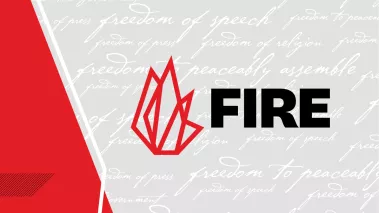Table of Contents
Red Alert at Bucknell University: Permission Needed to Promote a Cause

On Tuesday, FIRE announced our full-page advertisement in U.S. News & World Report's college rankings issue, alerting prospective students and their parents to consider avoiding the six schools on our Red Alert list. We warn people about Bucknell University, Michigan State University, Brandeis University, Colorado College, Johns Hopkins University, and Tufts University because they are the "worst of the worst" nationwide when it comes to meeting their free speech obligations.
Bucknell is in the ad, which we place every year, for the first time this year—although it was added to the list almost a full year ago. We have given Bucknell plenty of chances to revise the policies it used to shut down the expression of the Bucknell University Conservatives Club (BUCC). Until Bucknell's new president, John Bravman, came on the scene, we've seen nothing from Bucknell but misrepresentations of the truth by Bucknell University General Counsel Wayne Bromfield, accusations by Bromfield that FIRE is distorting the truth (despite our well-documented audio, video, and written evidence), shifting stories from Bromfield—and, yes, one policy revision—which made the policy in question even worse.
This policy is Bucknell's "Sales and Promotions" policy, formerly called the "Sales and Solicitation" policy (it is called by both names in the 2010-2011 Student Handbook (PDF)). Far from a policy that merely regulates commercial speech, this policy on its face applies to all promotions of "causes" campus-wide. It is the policy under which a Bucknell administrator shut down BUCC's distribution of non-commercial literature. The administrator even claimed that the policy referred to handing out Bibles on campus:
The policy is in place to protect the entire BU community and I said that consistently permission was needed to hand out anything from Bibles to other matter. You just can't hand things out without approval.
The other policy that has earned Bucknell University its national shame is an unwritten policy against satirical "affirmative action bake sales" and similar sales such as "wage gap bake sales," in which students participate in making a political point by charging—or opting to pay—different prices for the same baked goods based on their group identity (such as race or gender). Whether the point is to draw attention to race-based policies or the disparity in average wages between people of different genders who do the same jobs, this is perfectly legitimate political expression on a college campus, as many colleges and universities have reaffirmed. The bake sales also do a lot to inspire debate on campus.
When the pricing is merely satirical and optional, there is really no argument that the bake sales are "discriminatory." Yet, Bucknell refuses to let BUCC or any student group hold such an event on campus. Instead, Bucknell has declared that such speech is unwelcome on campus and that students who want to make such political points must find other forums in which to express themselves. This is inconsistent with free speech, to put it politely.
Thus, Bucknell has two policies to change, but this is not difficult. It frankly is a mystery that such easy changes have not already been made. Maybe Bucknell was waiting for the retirement this summer of Associate Dean of Students Gerald W. Commerford, who first enforced the unwritten bake sale policy against BUCC. (Commerford is apparently so fearsome that the student newspaper refused to print a critical advertisement from FIRE that targeted Commerford's actions. The newspaper argued that the ad could lead to a libel lawsuit from Commerford!)
All Bucknell needs to do to get off of FIRE's Red Alert list is (1) fully protect free speech with a revision to its "Sales and Promotions" policy and (2) show that henceforth it will permit bake sales with optional, satirical pricing to go on. FIRE wrote President Bravman about these policies once again on September 1, 2010, and we await a response. We would love to be able to remove Bucknell from the list and credit Bravman for being a champion of free speech.
We have some further, creative plans for publicity if Bucknell chooses to keep restricting free speech (can anyone say Homecoming Weekend?). The consequences of preserving free speech on campus are positive for everyone in a marketplace of ideas, but the consequences of restricting free speech will keep haunting Bucknell, year after year, until Bucknell gets its policies in line with free speech.
Recent Articles
FIRE’s award-winning Newsdesk covers the free speech news you need to stay informed.

No president gets to decide who deserves a lawyer

Free speech in an age of fear: The new system loyalty oaths – First Amendment News 464

AI is new — the laws that govern it don’t have to be
